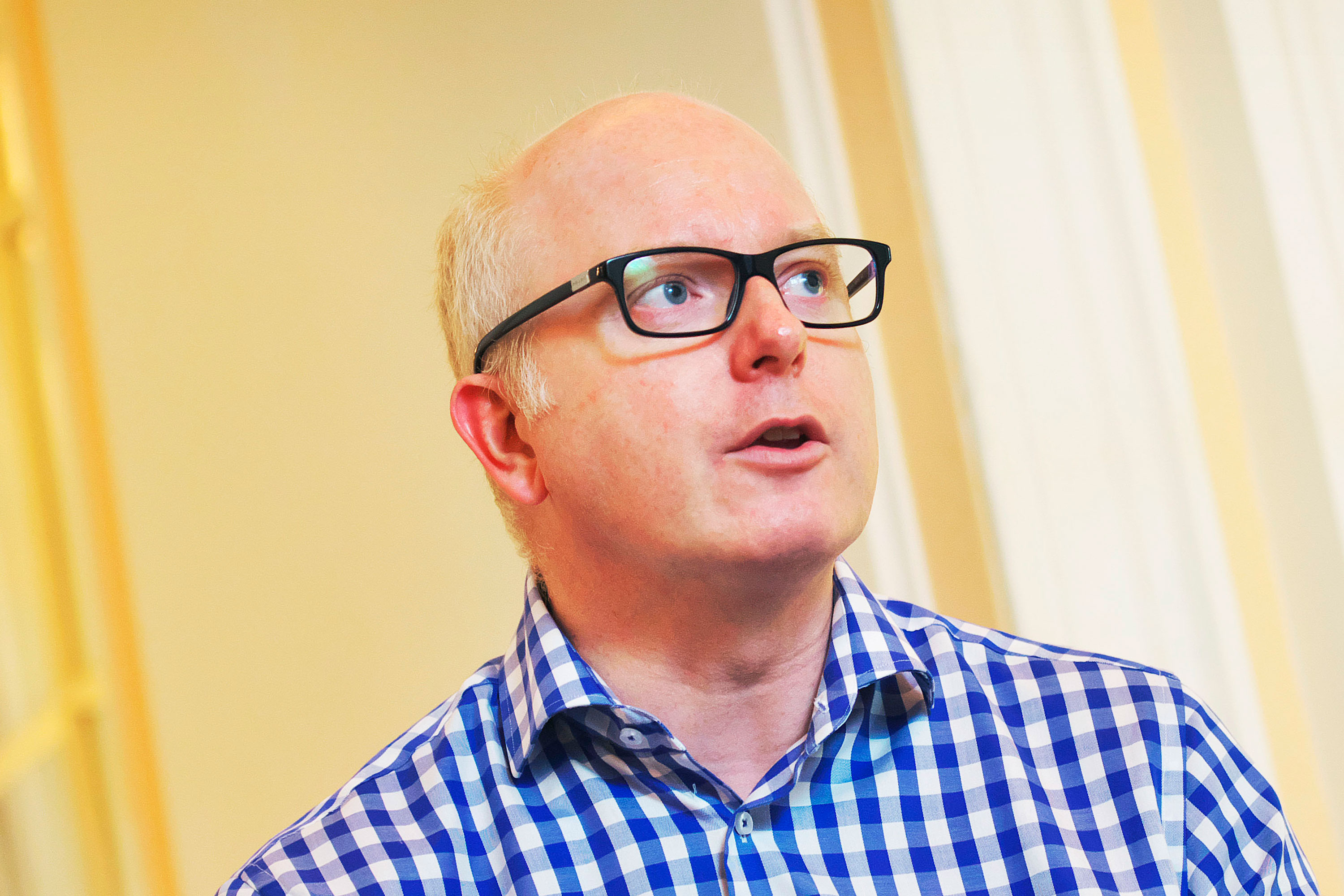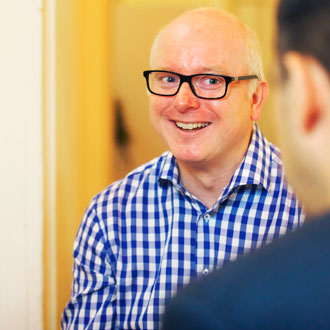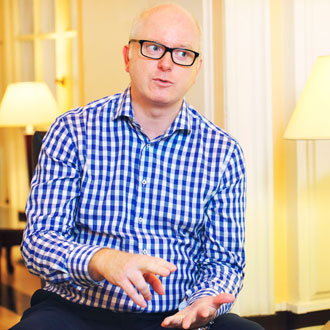
dr robert varnham 3×2
Dr Robert Varnam is halfway through his tour of England by the time we meet at the Pulse Live conference in Liverpool. Today, he has just driven from Hampshire, where he had been talking to GPs about how they can reduce their workloads through a £30m programme he is leading – ‘Time to Care’.
To say NHS England’s head of general practice development is passionate about the scheme is an understatement. He’s due on stage, but he’s vividly laying out ideas he’s heard from GPs across the country to cut workloads. After his presentation, he implores GP delegates to talk to him, to find out what the true grassroots thinks of the plans – which intends to train practice how to reduce DNAs, increasing personal productivity and use social prescribing among other ‘high impact actions’.
It formed a key part of NHS England’s GP Forward View, for which Dr Varnam was one of the main architects. Speaking to Pulse, it is clear that Dr Varnam – who is still a GP in one of the most deprived areas of England, Rusholme in Manchester – genuinely believes in the measures laid out in the GPFV.
But he is aware that GPs are desperately in need of more no-strings-attached funding, that doesn’t require them to jump through hoops.
With the massive injection of £2.4 billion going into general practice funding by 2020, can GPs expect increases to their core funding?
Yes. That is already being done across a variety of funding streams, like the core GP allocations but also through things like CCG funding. They already provide about £1.8 billion towards general practice. That is rising.
The thing that practices aren’t always confident about is that this is not about one-off offers, or bids, or competitions or pilots, this is about increases in recurrent funding. There are new pots of funding for transformational things as well, but that is a different matter.
So what do you take to mean by core funding?
Things like what comes through the GP contract – global sum, QOF, enhanced services – core CCG funding, Health Education England funding for trainees, DH funding for vaccinations and immunisations, existing capital funding. Those funding streams together have started to increase and they will continue to increase as we get to the £2.4 billion.

dr robert varnham 330x330px 1
GPs would welcome much of this funding, but what they are really crying out for is an increase in the national contract funding – mainly the global sum, but also QOF and DESs. Can they expect to receive increases regardless of their CCG, or whether they are a training practice?
Practices will receive increased money in the future, just like they have done this year to support practices without prejudice, without opting in. The other things are optional. We’re often asked the question how much will be in the global sum, or QOF, or enhanced services next year or the year after. That will continue to be decided in the negotiations between the GPC and the Government. So we don’t know.
But this year we have seen an increase, next year and the following year will see increases because that is the biggest part of the funding general practice receives. And for the foreseeable future it will continue to be a major part of it.
So are the days of the 1.3% funding uplifts are over?
We can’t say anything about the size of any of the specific funding streams. But the intention is absolutely by 2020, practices can be confident that the total funding going into practices independent of transformation funding, will be going up and will total an estimated £2.4 billion.
The size of individual funding streams that are not controlled by NHS England hasn’t been decided.
So what would be your message to practices in terms of national contract funding?
The encouraging thing for practices is that there is an unprecedented commitment by the NHS and Government to a long-term growth, not just 12 months to 12 months. And that is not just money for new things, or bidding to be part of pilots – it is about the well-known usual streams of funding practices receive now. That is what is being increased now. Practices can have confidence that the sustainability of practices will be supported by this funding.
GPs are telling us that the biggest contributor to their workload crisis is ever-increasing patient demand. What’s NHS England doing to ensure that patients aren’t unnecessarily an already-overstretched service?
Firstly, we want to help patients and their carers look after themselves more of the time. The NHS self-care team have already started work around the country to identify who could managing more of their own condition, and aid that by systematically putting in place training and education, information and other support.
Other things that are happening is the use of a new, approved apps library for people either to look after the condition themselves or to address the acute illnesses, because actually a lot of the growth in demand also seems to be with people with acute self-limiting illness.
Some of that is about marketing or messages about the most appropriate place to go, so there’s been quite a lot of focus across the country in the last few years on helping the public to choose A&E services wisely. We think we need to look at how we might have a similar effect for helping patients use general practice more wisely.
For example, GPs in Slough over the last couple of years have been visiting primary schools and educating the children there about the most appropriate place to go. The impact has been great, it’s been really welcomed by the school and the children, and that positive ‘pester power’ influences parents’ decisions about whether to call the GP or just have some paracetamol and go to bed early.
Many of NHS England’s ideas are predicated on practices federating. Do you think there is a future for small practices?
While there will always be some practices, particularly in rural areas, who operate as quite a small unit – and that’s natural and probably essential – actually we think the benefits of collaborating are so great that it will surprising if many practices choose not to collaborate much, much more.
It’s crucial to emphasise that it will vary structurally across the country. People talked a lot two or three years ago about commercial or industrial-sized super-partnerships. But, also in the last couple of years, practices have proven how much collaboration they can do while maintaining small team aspect of their work as well.
However, there are some opportunities for bringing other people in the workforce that are really hard to do if you’re a small team. The idea that you could have a 0.3 whole time-equivalent pharmacist in a single practice working on its own – it’s very hard to make that practical and attractive to pharmacists. But if you’re working across several practices sharing one person between you, it’s entirely feasible.
But is it fair to say that the small practices working on their own probably have much of a future?

dr robert varnham 330x330px 2
I think it’s going to get increasingly hard for them to do a sustainable job for their patients, to be honest. But I think that’s not because it’s wrong to be small – it’s because it’s increasingly missing opportunities if you’re not collaborating.
So I think the issue is not so much size, as isolation. I think that’s true even for large practices, so my own practice, with over 20,000 patients, recognise that even though we will be doing better care and having a better working life if we are collaborative. I think it’s the isolation that’s risky. I don’t worry about practices who are small – I worry about practices that are isolated.
NHS England has explicitly acknowledged that the GPs’ workload needs to be addressed. Is it really the right time to be moving towards a seven-day routine GP service?
The Government have made it very clear when they were elected that one of their commitments to the country was to extend hours and that’s been an unchanged mandate and requirement for the NHS.
But NHS England have been able to address some of the things GPs have been most concerned about. A couple of years ago, many practices feared that NHSE would require every GP to work seven days a week or every practice to open seven days a week. We’ve been very clear that the future is collaborative working, and we want patients in an area to have improved access and extended hours.
And the big thing there is there being no one-size-fits-all solution. The precise details of weekend opening is that it needs to meet local patients’ needs. And that will vary everywhere, so while there should be some appointments available on Saturdays and Sundays, CCGs and practices are expected to tailor that according to what the need is. So in those parts of the country where there is very little demand on a Sunday or certain times on a Saturday, then it wouldn’t be helpful offering services patients don’t need.
CV
Age
45
Education
Qualified in 1995 from the University of Manchester
Career
(selected highlights)
- 1998-present, GP in Rusholme, Manchester
- 2010–2011 Clinical lead, practice accreditation, RCGP
- 2010–2011 Clinical lead, RCGP Centre for Commissioning
- 2011-2013 Clinical lead, primary care and commissioning, NHS Institute for Innovation and Improvement
- 2013-present Head of general practice development, NHS England
Family
Married, one son
Other interests
He enjoys cinema, cycling and hill walking with the family and is a leader in the Ivy group of churches in Greater Manchester. He provides mentoring and coaching to leaders in the NHS and charities.
Pulse October survey
Take our July 2025 survey to potentially win £1.000 worth of tokens












